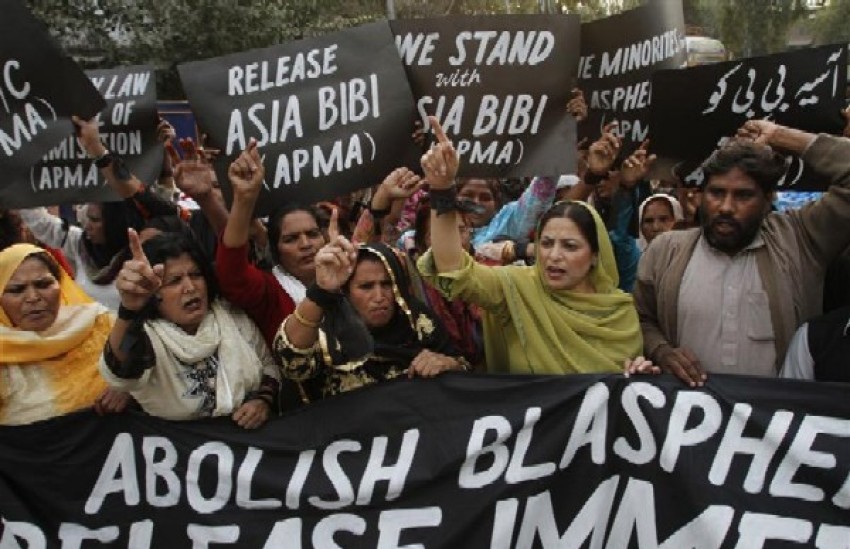Christian Mother of 5 Asia Bibi Marks Sixth Year of 'Brutal' Incarceration in Pakistan as She Faces Death Penalty for Blasphemy Charge of Drinking Water

As Christian mother of five Asia Bibi marks her sixth year in prison in Pakistan, placed on death row for blasphemy charges, a U.K. Christian group reports that some attempts are being made to reform sections of the country's controversial blasphemy laws that punish religious minorities. The group also believes that Britain and the U.S. must rethink the way they provide financial aid to Pakistan if they want to see reforms in the country.
"The proposed changes will ostensibly make it more difficult for blasphemy charges to be laid, focusing on proving that any blasphemy was intentional under a legal concept termed Mens Rea translated as 'guilty mind,'" Wilson Chowdhry, president of the British Pakistani Christian Association, told The Christian Post on Wednesday.
"However the large number of extra-judicial killings and insouciance from local police to get involved in blasphemy charges or a pattern of local police authorities cowing under pressure from mobs led by local imams, suggest this law change will have little effect."
Bibi was charged in 2009 after she was accused by a group of Muslim women to have committed an act of blasphemy when she drank from the same water supply as them. She was later sent to prison and sentenced to the death penalty.

The 50-year-old mother has been suffering from a number of health problems while in prison, including intestinal bleeding, and is having trouble walking, her family has said.
In a separate press release explaining more about her case, Chowdhry called her fate a "travesty of justice."
"For some time we have been told that there has been a moratorium on the death penalty because of pressure from Western donors. But even before this vanished at the end of last year, it has become clear that her treatment was, in effect, a slow death sentence by neglect and worse, all for allegedly committing a crime that should not exist — blasphemy," he said.
Christians and other minorities in Pakistan are often targeted by the loosely written blasphemy laws, and there have been on and off attempts in parliament to try and strengthen their definition.
Mission Network News reported earlier this week that international pressure is pushing the country's legislators into considering changes to the laws, which could potentially prevent other Christians from suffering the same fate as Bibi in the future.
Chowdhry told CP that a second proposed change to the blasphemy laws are punishments for
misuse of the law.
"Outwardly these would seem to be a more positive step; however, Article 153-A of the Penal Code prescribes punishments for promoting 'enmity, hatred or ill-will between different religious, racial, language or regional groups or castes or communities.' Ineffective implementation has led to mass mob attacks across the country, often targeting Christian communities."
The killing and burning-alive of Christian couple Shama and Shahzad Masih in November 2014 by a Muslim mob for allegedly desecrating the Quran stands as a prime example of extremists taking the law into their own hands.
Chowdhry also said that it's hard to believe the changes to the law will be approved, however, noting that similar changes have been proposed before, but were never ratified.
"The whole of the country came to a standstill after Sunni Muslim leaders called for a strike and effigies of the pope were burned after he openly supported the changes. In a country with so much animosity to change it will be hard approve such law changes and even harder to enforce."
Back in May, human rights activist and former minority member of parliament Pervez Rafique also told CP in a separate interview that it is hard to see real changes coming soon to the blasphemy laws.
"It's hard to change or relax the laws," Rafique explained, "especially the Blasphemy law 295-A-B-C of Pakistan's penal code."
He said that while to change or abolish laws the parliament needs only simple majority, amending the constitution or any article of the constitution requires two third majority — and the present government that supports the blasphemy laws still has enough support to continue upholding them.
Chowdhry noted that both the U.K. and U.S. governments spend big in aid programs to help Pakistan, which is an important strategic partner in the fight against terrorism in the region. He suggested, however, that the budgets need to be used to "eradicate the existing schism between Muslim's and non-Muslims through grassroot programmes" and work with schools.
"The hatred and animosity that exists is the culmination of labeling minorities as anathema, culturally, and reinforcing this through a curriculum that caricatures and demonises minorities. Earlier generations lived in relative peace as they would not have suffered the same brainwashing, and it will take an equally long term commitment toward peace to reverse the hatred," he added.
The BPCA president concluded that Britain and the U.S. need to move away from realpolitik if they want to affect real change.
"Anything less will only serve to continue the existing malaise which essentially will culminate in our nations being embroiled in a similar societal divide within our own communities."
"BPCA has also started an online petition for Bibi's freedom, and has called on Christians to pray for her family, who are in hiding."



























